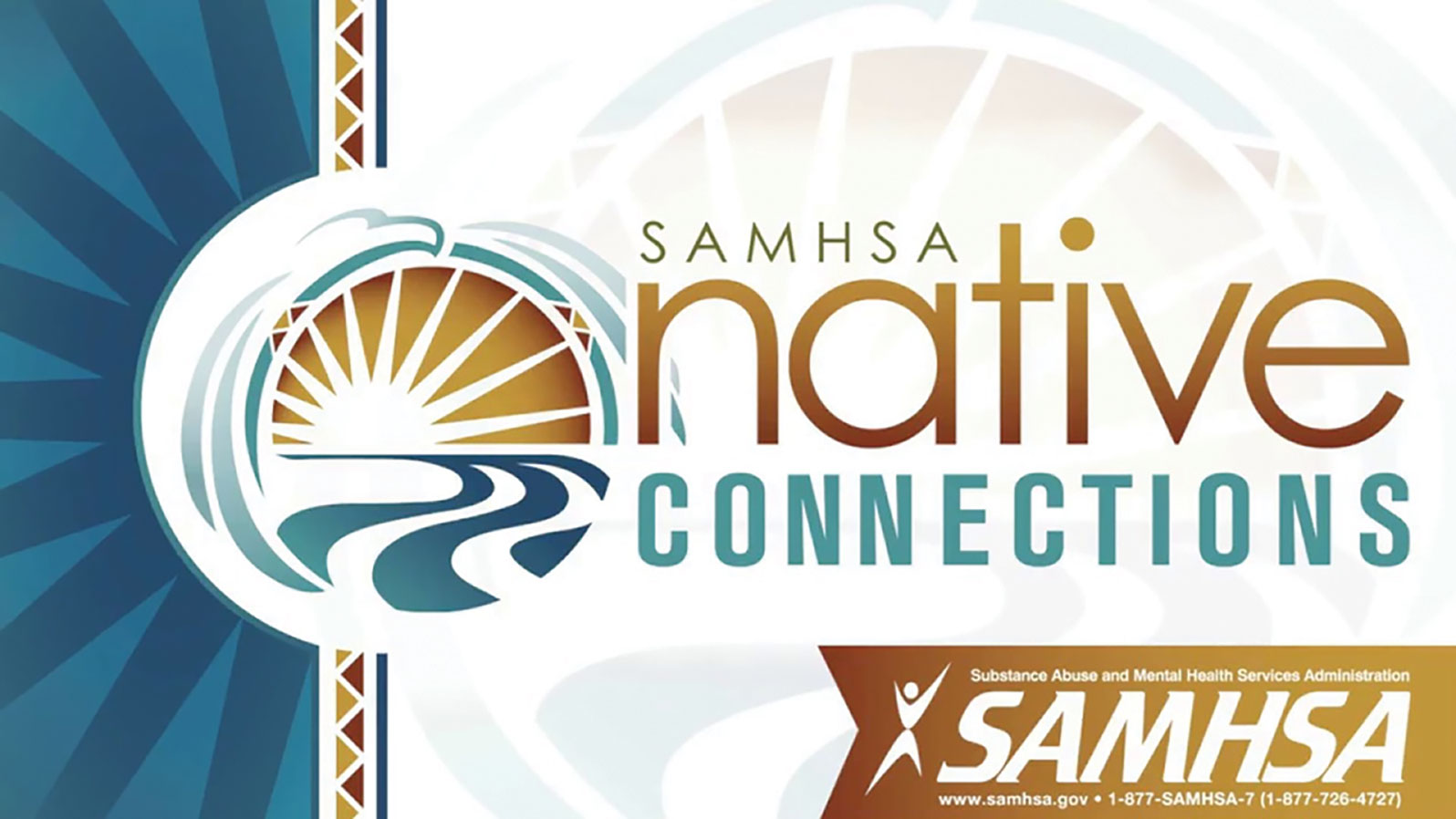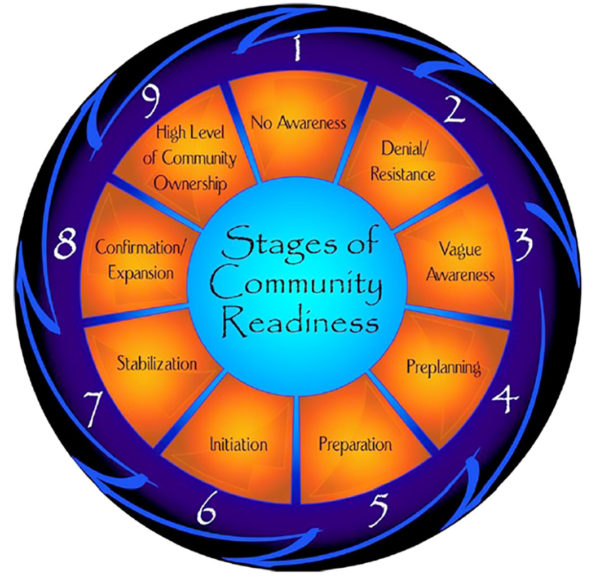Native Connections investigates community truths about Substance Use Prevention.
In 2019 the Southern Ute Indian Tribe was awarded a five-year grant under the Substance Abuse and Mental Health Services Administration (SAMHSA) to help American Indian and Alaska Native communities identify and address the behavioral health needs of Native youth.
This grant program goals are:
- Reducing suicidal behavior and substance use among Native youth up to age 24.
- Easing the impacts of substance use, mental illness, and trauma in tribal communities.
- Supporting youth as they transition into adulthood.
Through this grant we have access to technical support and services and use evidence-based tools and strategies to evaluate and improve conditions. One of these tools is called the Community Readiness Model.
In February 2021, the Southern Ute Native Connections Program conducted our first Community Readiness Assessment for the Southern Ute Indian Tribe, with technical assistance from the Native Connection’s Communication Specialist and Grantee Technical Assistant, Marvin “Marty” Richardson, Ph.D. We chose to conduct the assessment to find out our readiness scores for substance use prevention on the Southern Ute Indian Reservation.
What is being scored?
Dimensions of readiness are key factors that influence your community’s preparedness to act on substance use prevention. The six dimensions identified and measured in the Community Readiness Model are very comprehensive in nature. It is an excellent tool for diagnosing your community’s needs and for developing strategies that meet those needs.
- Community efforts: To what extent are there efforts, programs, and policies that address substance use prevention?
- Community knowledge of the efforts: To what extent do community members know about local efforts and their effectiveness, and are the efforts accessible to all segments of the community?
- Leadership: To what extent are appointed leaders and influential community members supportive of substance use prevention?
- Community climate: What is the prevailing attitude of the community toward substance use prevention? Is it one of helplessness or one of responsibility and empowerment?
- Community knowledge about the issue: To what extent do community members know about or have access to information on substance use prevention, consequences, and how it impacts your community?
- Resources related to the issue: To what extent are local resources (people, time, money, space) available to support the prevention efforts?
Our community’s status with respect to each of the dimensions forms the basis of the overall level of community readiness.
Our Scores
The following stage of readiness scores for each of the dimensions are:
Dimension Stage Score
A. 5.8
B. 4.36
C. 3.4
D. 3.6
E. 4.07
F. 4.03
As you can see, our scores for each of the dimensions are anywhere from #3 Vague Awareness stage to #5 Preparation stage.
From these scores we have an overall readiness score of 4.24 which puts us in the “Preplanning” stage: There is clear recognition that something must be done, and there may even be a group addressing it. However, efforts are not focused or detailed.
What does this mean?
According to the Community Readiness Model, we need to address both the stage we are in and strategize to increase our scores to 5, 6, and onward until we hit the score of 9.
Suggested strategies for Stage 4: Preplanning
Goal: Raise awareness with concrete ideas.
- Introduce information about substance use prevention through presentations and media. Focus on reducing stigma and raising general awareness.
- Visit and get community leaders invested in the cause.
- Review existing efforts in community (curriculums, programs, activities) to determine who the focused populations are and consider the degree of success of the efforts.
- Conduct local focus groups to discuss substance use prevention and related issues and develop some basic strategies.
- Increase media exposure through radio and television public service announcements.
Interested in learning more or helping us reduce substance use on the reservation?
The Southern Ute Native Connections Program will be scheduling community meetings for every month of 2021 to promote substance use prevention and our Southern Ute Prevention Coalition. Please join the coalition if you wish to know more information and to help us brainstorm our strengths, conditions/concerns, and our resources to combat substance use and mental health issues on the Southern Ute Indian Reservation. See Upcoming Community Events for more information below.
Want to help and be a part of the change? Looking for community members and youth to join the Prevention Coalition tasked to reduce youth substance usage, eliminate mental health stigma, and start the discussion around suicide and prevention.
Upcoming Prevention Coalition Meetings: We are going virtual! For more information please contact Precious Collins, Native Connections Program Coordinator for more information 970-563-2487.
Upcoming Training: FREE online Suicide Prevention Training- Question, Persuade, Refer (QPR) for Southern Ute Tribe Employees, and Southern Ute Tribal Members. Let’s all learn the warning signs and what to do if someone is experiencing a crisis.
Please contact Precious Collins at 970-563-2487 or email prcollins@southernute-nsn.gov to sign up.
Upcoming Community Events: The Southern Ute Prevention Coalition will be meeting on March 11th and 18th (same meeting two different dates) to go over the basics of the coalition and to introduce the framework we’ll be using to develop an action plan to address substance use on the Southern Ute Indian Reservation. You can email Precious Collins for meeting registration, prcollins@southernute-nsn.gov
- March 11, 1 – 2:30 p.m. : Zoom Meeting ID: 853 8571 3101
- March 18, 5:30 – 7 p.m. : Zoom Meeting ID: 828 5776 6262
Local Resources:
- Southern Ute Health Center – Behavioral Health Division: 69 Capote Drive, Ignacio, CO 970-563-4581. For local Native Americans. We are here to support mental health, substance use prevention, treatment, and recovery. Please call to schedule an appointment to talk to someone.
- Southern Ute Division of Social Services: 116 Capote Drive, Ignacio, CO 970-563-2331 for local Native Americans needing assistance with child welfare needs and family support.
- Southern Ute Police Department: Anonymous Tip Hotline Do you have information about a crime?
- Please call (970) 563-4999. This “Tip Line” was designed to allow you the ability to provide law enforcement with information, anonymously if need be, regarding criminal, drug, or suspicious activity. The “Tip Line” is monitored around the clock by SUPD Investigators, but it DOES NOT replace 9-1-1 or the non-emergency police number (970) 563-4401.
- St Ignatius Catholic Church: Pastor Cesar Arras, 14826 CO-172, Ignacio, CO 970-563-4241.
- Ignacio Community Church: Pastor Randall Haynes 405 Browning Ave, Ignacio, CO (currently located inside ELHI) 970-759-3633
- Second Wind Fund of the Four Corners: Believes that every child and youth at risk of suicide should have access to the mental health treatment they need. We match children and youth at risk for suicide with licensed therapists in their communities, 720-962-0706.
- Women’s Resource Center, creates personal, social, and professional growth opportunities for all women in La Plata County, 970-247-1242.
State or National Resources- All are 24/7
- 24/7 Axis Crisis Line – SW Colorado: 970-247-5245 or Text 741741
- Colorado Crisis Line: 844-493-8255 or Text “TALK” to 38255. You’ll immediately be put in contact with a trained counselor, ready to text with you about anything.
- The National Suicide Prevention Lifeline: Has both an online chat and a 24/7 phone line at 1-800-273-8255 if you are thinking of suicide or need help for a loved one.
- The Trevor Project: Which seeks to serve LGBT youth, has a 24/7 suicide prevention line at 866-488-7386.


